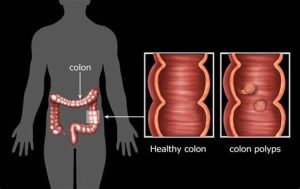Colon polyps are small clumps of cells that form on the lining of the colon (large intestine). Most colon polyps are harmless, but over time, some can develop into colon cancer. Here’s what you need to know:

- Causes and Risk Factors:
- Colon polyps can occur in anyone, but certain factors increase the risk:
- Age: People over 50 are at higher risk.
- Overweight or obesity.
- Smoking.
- Personal or family history of colon polyps or colon cancer.
- Healthy cells grow and divide orderly, but changes in certain genes can cause abnormal cell growth, leading to polyps.
- Colon polyps can occur in anyone, but certain factors increase the risk:
- Symptoms:
- Most people with colon polyps don’t experience symptoms.
- Some signs include:
- Change in bowel habits (constipation or diarrhea lasting over a week).
- Blood in stool (visible or microscopic).
- Iron deficiency anemia due to slow bleeding.
- Abdominal pain if a large polyp blocks part of the bowel.
- Diagnosis and Screening:
- Regular screening tests are crucial to detect polyps early.
- Screening methods include:
- Colonoscopy: A tube with a camera examines the colon. Polyps can be removed during the procedure.
- Virtual colonoscopy: Uses a CT scan to view the colon.
- Flexible sigmoidoscopy: Examines the last third of the colon.
- Stool-based tests: Check for blood or DNA evidence of polyps.
- Treatment:
- Polypectomy: Removal of smaller polyps during colonoscopy.
- Minimally invasive surgery: For larger or difficult-to-remove polyps.
- Total proctocolectomy: Rarely needed for inherited syndromes like FAP.
- Follow-up screenings are essential after polyp removal.
Remember, early detection and removal of polyps are crucial for preventing colon cancer. If you’re at risk, consult your healthcare provider for screening recommendations.



